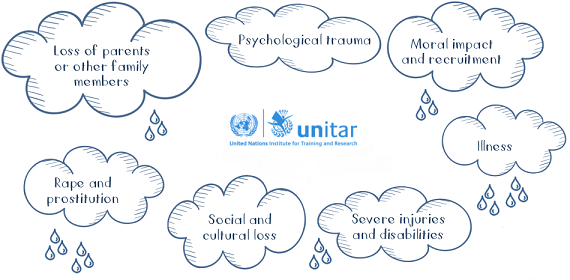Systemic rape is a war crime, yet it is committed in conflict zones all around the world. Young people are often either raped or forced to prostitution as a source of income. This gives way to the contagion and spreading of sexually transmitted diseases such as HIV/AIDS.
Lots of young people and children end up as orphans, they might be unaccompanied refugees who need special protection in their host countries and are often forced to sacrifice their childhood in order to work and support their siblings.
Insomnia, depression and passive-aggressive behavior are only some of the symptoms of post traumatic stress disorders. Many of these psychological traumas remain untreated and often result in further violence. Also, the traumas of family members often lead to abuse and domestic violence from which children and youth suffer.
Countless young people have also suffered from the brutalization that comes with war, many have been forced to kill or execute or to prostitute themselves. Apart from traumatisation, this leads to a generation who will keep resorting to violence because they do not know and have never learned to respect life and to resolve conflict without the use of violence.
Young people are often more vulnerable to diseases stemming from malnutrition or infectious diseases than adults.
Children and youth are targeted by combatants, they are often collateral damage or they are accidentally injured and maimed by exploding devices or unexploded ordinance devices (UXO).
Especially when young people are displaced, they are often forced to adopt the culture of their host country and unlearn or negate their own. Eventually, they lack a sense of identity, being seen as a stranger in the host culture, and being alienated from their own.
